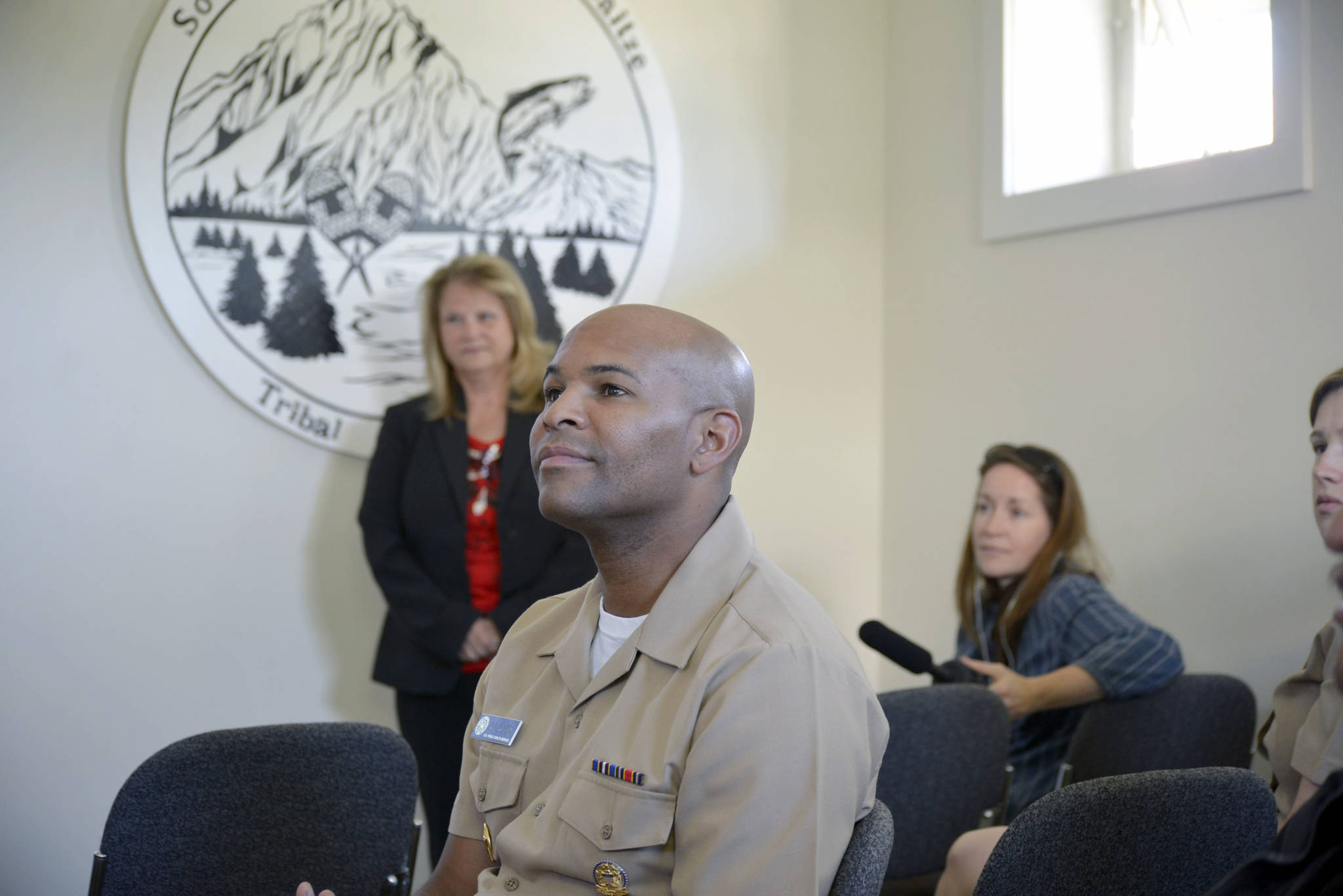The federal official tasked with providing health advice to the nation last week lauded the Kenaitze Indian Tribe’s holistic approach to health care.
In a tour of the tribe’s Dena’ina’s Wellness Center in Old Town Kenai on Thursday, U.S. Surgeon General Vice Admiral Jerome Adams said he hoped to find ways of supporting and scaling up the facility’s integrated approach to providing wellness — which centralizes a number of health services, including medical, behavioral and traditional healing.
“This is just a tremendous asset to the community,” he said. “It’s a model for the rest of the country. Folks hear about the opioid overdose epidemic that’s going on in the country and affecting Kenai — they can hear abut the poverty here, they can hear about the unemployment rates — but it’s equally important that they hear about the great integration and collaboration that’s leading to better health in Kenai.”
At the Kenaitze Indian Tribe’s campus, Adams met participants in the Henu’ Community Wellness Court — a joint-jurisdiction court that diverts cases for certain defendants facing charges related to substance abuse.
During a presentation in a packed room, Kenaitze Tribal Court Chief Judge Susan Wells described the court’s community-based approach, which brings together criminal justice officials — such as judges, lawyers and probation officers — and health care providers, including medical practitioners and behavioral health counselors to help clients recover from addiction and rebuild relationships with the community.
“What we’re doing here has been a dream. We know that locking people up isn’t really the most successful thing,” Wells said.
Tribal elder Eli Darien, who used drugs for 40 years and served several stints in jail before being diverted the court, was one of three Henu’ court clients who testified during the presentation. He said that the court was the first program that helped him overcome his addiction.
“I started with this program and I just figured I would give it a try — do everything, follow the rules and everything — and six weeks deep in the program I decided my life was changing,” he said. “I don’t ever want to get high again.”
Darien, who had just passed one year and five months of sobriety, is now working in the tribal fishery. He hopes to move into a position as a drug and alcohol counselor at the Dena’ina Wellness Center. He emphasized the need for alternatives to imprisonment when it comes to those who have substance abuse problems.
“Putting a drug addict in jail just ain’t working. It didn’t work for me. It was like I was going to jail just to rest up for the next party when I got out of there,” he said.
At the Wellness Center, Adams got a look at a number of the facility’s services, such a kitchen, fitness center and counseling — or “talking” — rooms.
“My impression so far has just been one of wonder. … I can’t think of anywhere I’ve been that has been more inviting, more tranquil when you walk in — more like what I personally would want my care to be like when I come into a health setting,” he said.
Adams said he was especially impressed with the collaboration between traditional healing and modern medical practices, he said.
“Just the cooperation and the integration here is amazing, and to see it can be done successfully … allows us to go back and write funding opportunities that will facilitate people to incorporate traditional care into their practices in the future,” he said.
The former Indiana State Health Commissioner who took on the role of surgeon general in September 2017, Adams visited a number of Alaska communities last week, including Anchorage, Mat-Su and Kotzebue, in an effort to better assess the state’s response to the opioid crisis.
“As surgeon general my goal is to make it to all of the states, because it would be incredibly presumptuous, and in my opinion incredibly wrong, of me to think that we can sit in Washington, D.C. and figure out what folks need in any part of the United States — and especially out here in Alaska,” he said.
As part of his visit, Adams met with the governor and cabinet members, participated in a community town hall on the opioid crisis in Anchorage, and worked with Project HOPE — a program of the Department of Health and Social Services — to prepare 400 Narcan kits for distribution, he said.
Narcan is a brand name for naxolone, a drug that can reverse opioid overdoses. In April, Adams released an advisory emphasizing the importance of naloxone and encouraging people to keep the kits on hand.
“Anyone can save a life. I’m so, so frustrated when I go around the country and everywhere I go there’s someone who comes up to me and tells me about their daughter or their son who died of an overdose — again in the bedroom next door or just downstairs — and to think that if they had naxolone they potentially could have intervened,” he said. “(They) potentially could have saved their loved one’s life.”
“Any death, any loss is a tragic one. But it’s especially tragic, it’s especially disheartening when you feel like it could have been prevented.”
Reach Erin Thompson at ethompson@peninsulaclarion.com.

